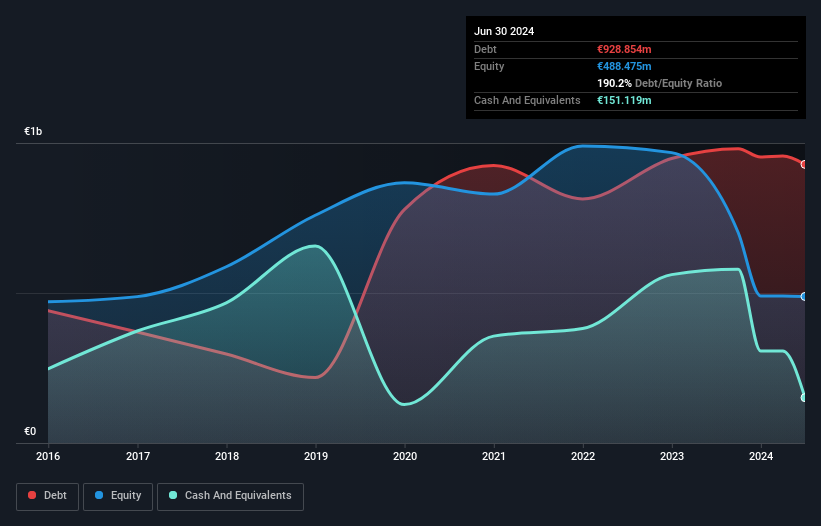- Greece
- /
- Infrastructure
- /
- ATSE:AIA
Athens International Airport (ATH:AIA) Seems To Use Debt Quite Sensibly

The external fund manager backed by Berkshire Hathaway's Charlie Munger, Li Lu, makes no bones about it when he says 'The biggest investment risk is not the volatility of prices, but whether you will suffer a permanent loss of capital.' When we think about how risky a company is, we always like to look at its use of debt, since debt overload can lead to ruin. We can see that Athens International Airport S.A. (ATH:AIA) does use debt in its business. But the real question is whether this debt is making the company risky.
Why Does Debt Bring Risk?
Debt and other liabilities become risky for a business when it cannot easily fulfill those obligations, either with free cash flow or by raising capital at an attractive price. Part and parcel of capitalism is the process of 'creative destruction' where failed businesses are mercilessly liquidated by their bankers. However, a more common (but still painful) scenario is that it has to raise new equity capital at a low price, thus permanently diluting shareholders. Having said that, the most common situation is where a company manages its debt reasonably well - and to its own advantage. When we examine debt levels, we first consider both cash and debt levels, together.
View our latest analysis for Athens International Airport
What Is Athens International Airport's Debt?
You can click the graphic below for the historical numbers, but it shows that Athens International Airport had €932.4m of debt in June 2024, down from €980.9m, one year before. On the flip side, it has €151.1m in cash leading to net debt of about €781.3m.

A Look At Athens International Airport's Liabilities
We can see from the most recent balance sheet that Athens International Airport had liabilities of €285.9m falling due within a year, and liabilities of €1.16b due beyond that. On the other hand, it had cash of €151.1m and €80.9m worth of receivables due within a year. So it has liabilities totalling €1.22b more than its cash and near-term receivables, combined.
While this might seem like a lot, it is not so bad since Athens International Airport has a market capitalization of €2.32b, and so it could probably strengthen its balance sheet by raising capital if it needed to. But we definitely want to keep our eyes open to indications that its debt is bringing too much risk.
We use two main ratios to inform us about debt levels relative to earnings. The first is net debt divided by earnings before interest, tax, depreciation, and amortization (EBITDA), while the second is how many times its earnings before interest and tax (EBIT) covers its interest expense (or its interest cover, for short). Thus we consider debt relative to earnings both with and without depreciation and amortization expenses.
Athens International Airport's net debt to EBITDA ratio of about 2.4 suggests only moderate use of debt. And its strong interest cover of 13.6 times, makes us even more comfortable. Also relevant is that Athens International Airport has grown its EBIT by a very respectable 21% in the last year, thus enhancing its ability to pay down debt. There's no doubt that we learn most about debt from the balance sheet. But it is future earnings, more than anything, that will determine Athens International Airport's ability to maintain a healthy balance sheet going forward. So if you want to see what the professionals think, you might find this free report on analyst profit forecasts to be interesting.
But our final consideration is also important, because a company cannot pay debt with paper profits; it needs cold hard cash. So we always check how much of that EBIT is translated into free cash flow. Happily for any shareholders, Athens International Airport actually produced more free cash flow than EBIT over the last three years. There's nothing better than incoming cash when it comes to staying in your lenders' good graces.
Our View
Athens International Airport's interest cover suggests it can handle its debt as easily as Cristiano Ronaldo could score a goal against an under 14's goalkeeper. But truth be told we feel its level of total liabilities does undermine this impression a bit. It's also worth noting that Athens International Airport is in the Infrastructure industry, which is often considered to be quite defensive. Zooming out, Athens International Airport seems to use debt quite reasonably; and that gets the nod from us. After all, sensible leverage can boost returns on equity. When analysing debt levels, the balance sheet is the obvious place to start. However, not all investment risk resides within the balance sheet - far from it. For example Athens International Airport has 3 warning signs (and 1 which doesn't sit too well with us) we think you should know about.
At the end of the day, it's often better to focus on companies that are free from net debt. You can access our special list of such companies (all with a track record of profit growth). It's free.
New: Manage All Your Stock Portfolios in One Place
We've created the ultimate portfolio companion for stock investors, and it's free.
• Connect an unlimited number of Portfolios and see your total in one currency
• Be alerted to new Warning Signs or Risks via email or mobile
• Track the Fair Value of your stocks
Have feedback on this article? Concerned about the content? Get in touch with us directly. Alternatively, email editorial-team (at) simplywallst.com.
This article by Simply Wall St is general in nature. We provide commentary based on historical data and analyst forecasts only using an unbiased methodology and our articles are not intended to be financial advice. It does not constitute a recommendation to buy or sell any stock, and does not take account of your objectives, or your financial situation. We aim to bring you long-term focused analysis driven by fundamental data. Note that our analysis may not factor in the latest price-sensitive company announcements or qualitative material. Simply Wall St has no position in any stocks mentioned.
About ATSE:AIA
Athens International Airport
Engages in the design, development, financing, construction, commissioning, maintenance, operation, and management of airport in Greece.
Second-rate dividend payer and slightly overvalued.
Similar Companies
Market Insights
Community Narratives




